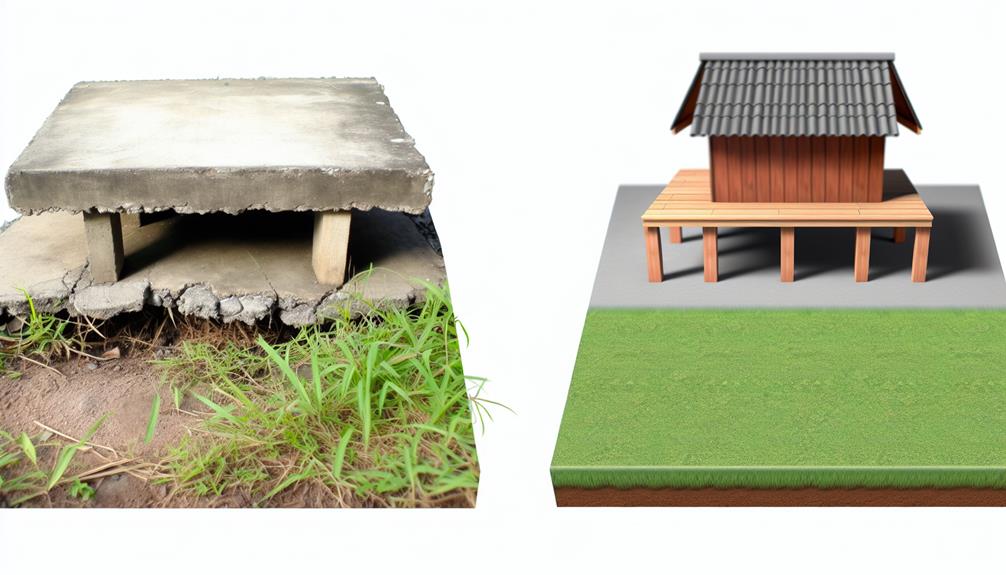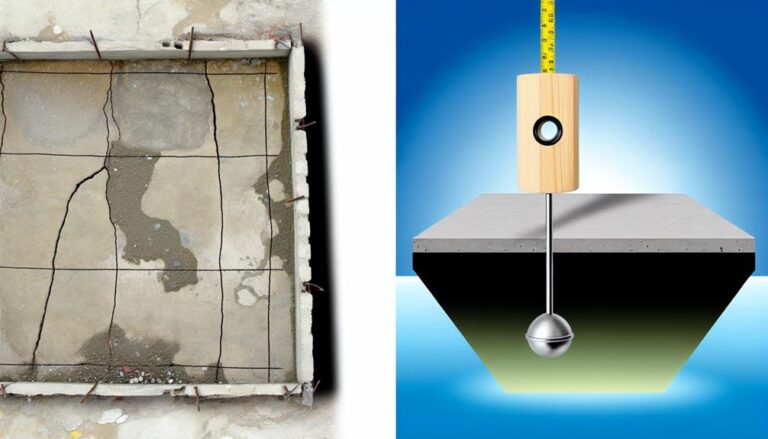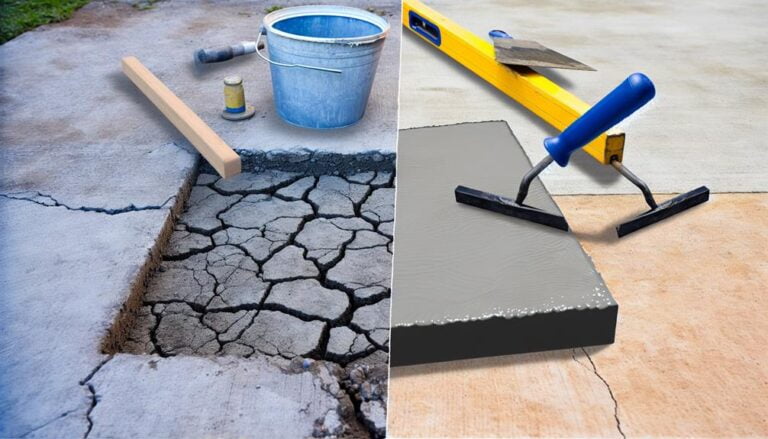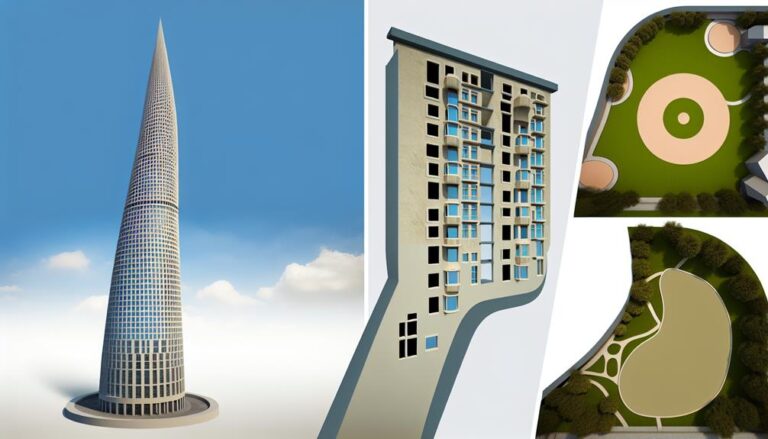5 Best Benefits of Concrete Leveling for Stability
Concrete leveling boosts your property's stability. It enhances structural integrity, filling voids under slabs to prevent damage. It's a cost-effective solution, requiring less material and time than traditional methods. You'll also minimize soil erosion, directing water correctly and preserving landscaping. Your property value could rise significantly, attracting buyers with smooth, safe surfaces. Moreover, this technique extends your concrete's lifespan, reducing cracks and wear. It's an investment in longevity. Intrigued? There's plenty more to discover.
Enhanced Structural Integrity
With concrete leveling, you're not just fixing a surface issue; you're enhancing the overall structural integrity of your property. This process involves filling voids under your concrete slabs with a special mixture to ensure a stable base. It's not just cosmetic; it's a vital improvement that can prevent serious damage in the future.
When your concrete starts to sink or crack, it's often a sign of an underlying issue. The soil beneath the concrete may be settling unevenly or might be washed away due to poor water drainage. If ignored, these problems can worsen, creating larger voids and causing more extensive damage.
By choosing to level your concrete, you're addressing these underlying issues head-on. The special mixture used in this process fills these voids, stabilizing the soil and preventing further sinking or movement. It's like giving your property a solid, reliable foundation on which to stand.
What's more, concrete leveling can even improve safety on your property. Uneven concrete can be a tripping hazard. By leveling your concrete, you're reducing this risk and creating a safer environment for everyone.
Cost-Effective Solution
Aside from its structural benefits, concrete leveling also stands out as a cost-effective solution for property owners. You may be wondering, how exactly does this method save money? Well, it's quite straightforward.
Firstly, concrete leveling requires less material than other traditional methods. You won't need to buy or pour new concrete, which can be quite costly. Instead, you'll simply be fixing and re-leveling your existing slab, which can be a much cheaper option.
Secondly, the process of concrete leveling is faster, meaning you'll save on labor costs. In most cases, the job can be completed in just a day or two, unlike other methods that can take a week or more. This reduced time not only saves you money but also minimizes the disruption to your daily routine.
Minimized Soil Erosion
Combatting soil erosion is another notable advantage of concrete leveling. You might be wondering how these two connect. Well, it's simple. Uneven concrete surfaces can lead to water pooling or run-off, which can gradually erode the soil beneath and around the concrete. This not only affects the stability of your concrete structures but also the overall integrity of your property.
With concrete leveling, you're able to maintain a smooth, even surface that allows for proper water runoff. This means that the water will flow in the direction it's supposed to, preventing soil erosion in unwanted areas. It's a win-win situation for you – you get to keep your concrete structures intact and protect your property from potential damage.
Here are a few key benefits of reduced soil erosion through concrete leveling:
- You'll be able to maintain the integrity of your landscaping, as soil erosion can lead to shifted plants and an unattractive yard.
- It helps to keep the foundation of your property stable, as soil erosion can affect the stability of your building.
- You'll save money in the long run, as you won't have to deal with the costs associated with repairing erosion-related damage.
Increased Property Value
Not only does concrete leveling protect your property from soil erosion, but it also boosts your property value significantly. You might be wondering, how does this happen? Well, let's delve into that.
Firstly, a leveled concrete surface improves the aesthetics of your property. Imagine having a driveway, walkway, or patio that's uneven and cracked – it isn't a pretty sight, is it? Now, imagine it all smooth, leveled, and crack-free. It's definitely more appealing, and appeal often translates to value.
Secondly, potential buyers or tenants often look for properties that require minimal maintenance. A leveled concrete surface means less frequent repairs and replacements, which can save them money in the long run. Thus, they're often willing to pay a premium for such properties, which in turn, increases your property's value.
Lastly, concrete leveling enhances the safety of your property. The risk of tripping and falling on an uneven surface is eliminated, making it safer for everyone, especially children and the elderly. Safety, as you know, is a big selling point and can significantly increase your property's appeal and value.
Longer Lifespan of Concrete
Another key advantage of concrete leveling is that it significantly extends the lifespan of your concrete surfaces. This process counters the effects of settlement and wear over time, ensuring that your concrete remains sturdy and durable for many years to come.
Concrete leveling is a preventive measure that saves you from costly replacements in the future. It's a cost-effective way to maintain the structural integrity of your concrete surfaces, whether they're driveways, sidewalks, or patios. This procedure helps you save money in the long run, as you won't have to constantly repair or replace your concrete structures.
Here are some key points to note:
- Concrete leveling prevents cracks and gaps that can lead to serious structural damage. By fixing these issues early on, you're extending the lifespan of your concrete.
- It reduces the risk of water pooling on your surfaces, which can cause your concrete to deteriorate more rapidly.
- The process strengthens your concrete, making it more resistant to wear and tear.
In essence, concrete leveling is an investment in the longevity of your concrete surfaces. It's not just about aesthetics, but also about ensuring that your concrete can withstand the test of time.
Frequently Asked Questions
How Long Does the Process of Concrete Leveling Usually Take?
You're curious about how long concrete leveling takes, aren't you?
The duration can vary based on the size and complexity of the project. However, most residential jobs are completed within a day.
Don't forget, it's not just about the time spent leveling; there's also curing time to consider.
Typically, you'll need to wait 24 to 48 hours before you can walk on the surface, and around a week for full usage.
Are There Any Specific Maintenance Requirements After Concrete Leveling?
After concrete leveling, you don't typically have any special maintenance requirements. It's as simple as keeping the area clean and free from heavy loads until it's fully cured, which usually takes about 24-48 hours.
However, it's always a good idea to follow any specific instructions given by your contractor. Remember, proper maintenance can extend the life of your concrete and keep it looking its best for years to come.
What Is the Environmental Impact of Concrete Leveling?
Surprisingly, concrete leveling's environmental impact is quite minimal. You're not adding new material, but rather reusing what's already there. Additionally, it's less disruptive to your landscape, sparing you the heartache of extensive yard damage.
And let's not forget, by fixing instead of replacing, you're reducing landfill waste. So, while you're enjoying a stable, leveled surface, you're also doing your part for the environment. It's a win-win.
Can Concrete Leveling Be Done for Structures Other Than Buildings Like Bridges or Roads?
Absolutely, you can level concrete for structures other than buildings. It's not just for homes or offices. You can use it for roads, bridges, sidewalks, and even airport runways.
It's a versatile solution that restores stability and prolongs the lifespan of these structures. So whether you're dealing with a sunken driveway or a cracked bridge, concrete leveling's got you covered.
It's a cost-effective and environmentally-friendly method that's definitely worth considering.
What Are the Safety Precautions or Measures Implemented During the Concrete Leveling Process?
You're right to ask about safety during concrete leveling. It's crucial to wear proper personal protective equipment, including gloves, safety glasses, and steel-toed boots.
Also, ensure the area is clear of bystanders. The equipment must be checked for any issues before use. If there's a chance of hitting utility lines, confirm their locations first.
Lastly, always follow manufacturer instructions for using the leveling equipment. It's all about maintaining a safe work environment.
Conclusion
So, you see, concrete leveling isn't just a quick fix. It's an investment in your property's future. With bolstered structural integrity, minimized soil erosion, and an extended concrete lifespan, it's a cost-effective solution that pays dividends.
And let's not forget the added bonus of enhanced property value! In short, concrete leveling is a true game-changer, offering stability that stands the test of time. Try it, and you'll see the difference.






